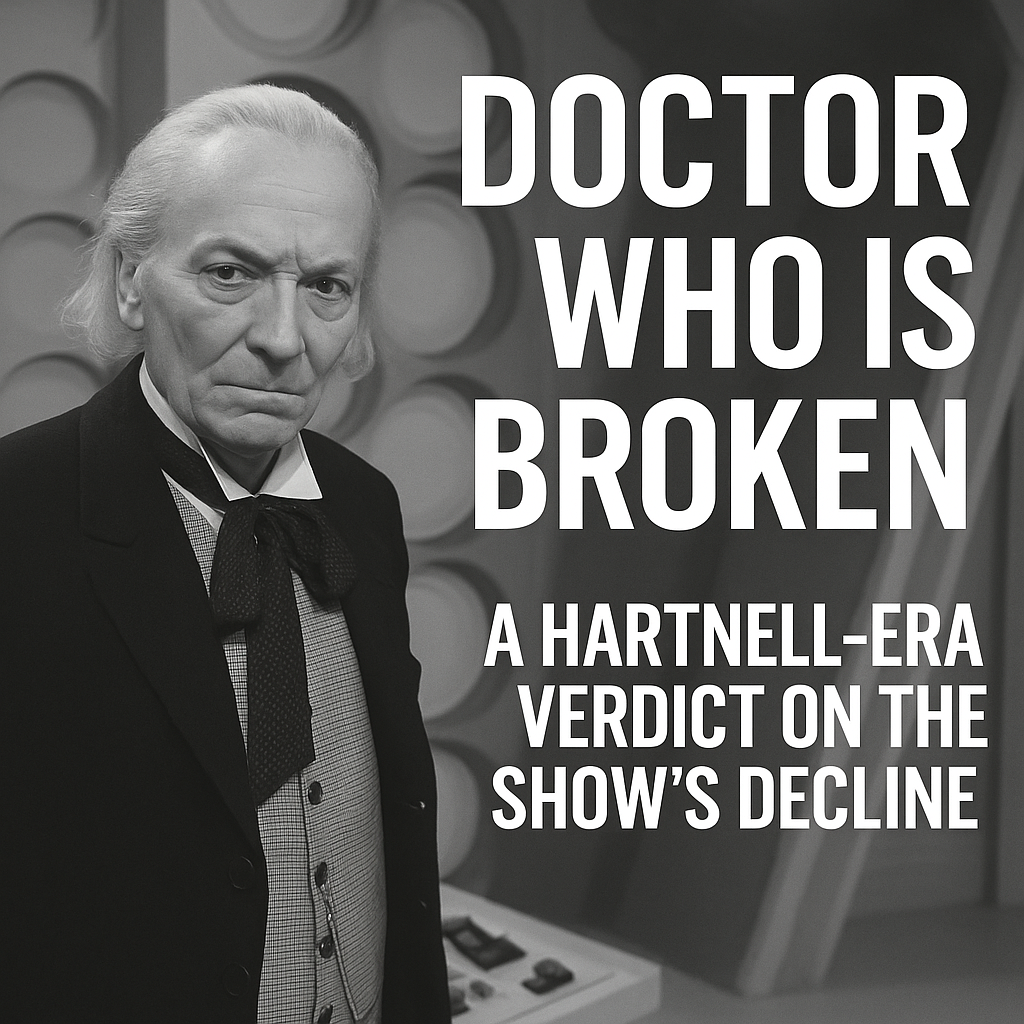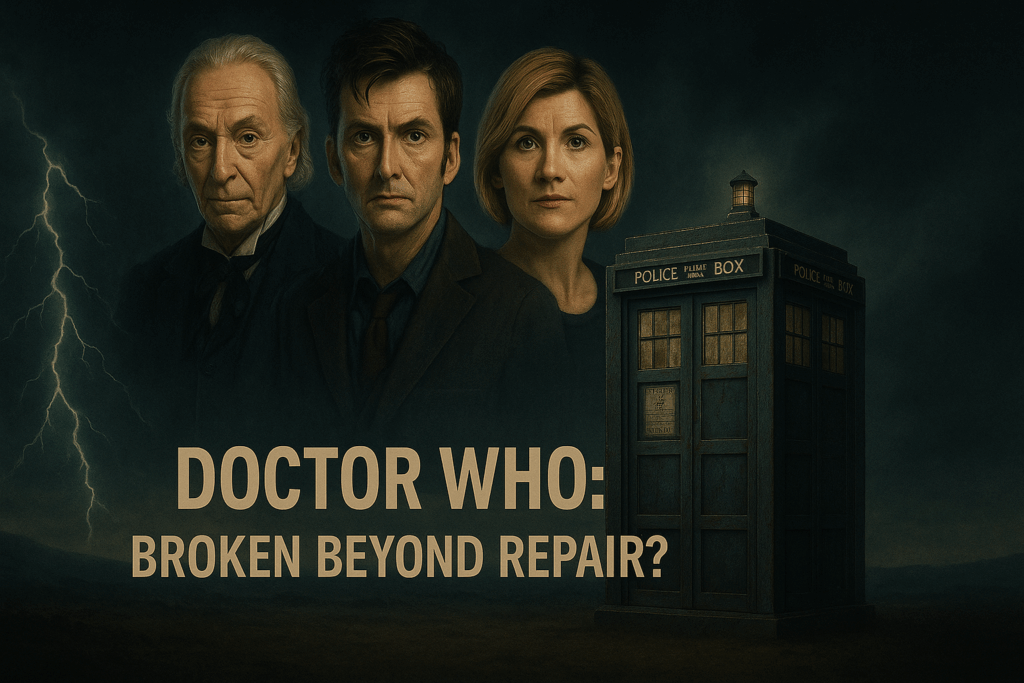🎭 Back in My Day…
“𝗛𝗺𝗺? 𝗪𝗵𝗮𝘁’𝘀 𝗮𝗹𝗹 𝘁𝗵𝗶𝘀 𝗻𝗼𝗻𝘀𝗲𝗻𝘀𝗲?”

It’s not hard to imagine William Hartnell’s stern First Doctor harrumphing in disapproval if he could see the state of Doctor Who today. Back in 1963, when the pilot episode of Doctor Who, An Unearthly Child aired, 4.4 million viewers tuned in to a strange new Saturday teatime sci-fi drama. Within weeks, Dalekmania had swept Britain, and audiences soon rocketed past 12 million.
Fast-forward sixty years, and the BBC’s flagship science-fiction brand — once untouchable — is fighting to keep even a fraction of that audience. Recent Disney-BBC co-productions of Doctor Who are drawing overnight ratings of just 2.5–3 million in the UK. By contrast, the David Tennant and Catherine Tate revival years consistently pulled in between 7–10 million.
The First Doctor would not be amused.
🌈 Woke or Broke? The Creative Dilemma
Much of the current debate centres not on budgets or special effects, but on creative direction.
The Jodie Whittaker era (2017–2022) divided fans sharply with the controversial “Timeless Child” storyline, which rewrote decades of canon and introduced the Fugitive Doctor. Rather than reinvigorating the franchise, ratings fell to historic lows — dipping below 4 million, the weakest since the 2005 revival.
When Russell T Davies returned in 2023, many hoped for another miracle like the one he delivered two decades earlier. Instead, his bold decision to recast the Doctor as a flamboyant, openly gay Scotsman (Ncuti Gatwa) drew mixed reactions. Admirers hailed it as groundbreaking representation. Detractors felt it was overtly politicising a character who, for most of his history, transcended identity politics.
Hartnell’s First Doctor — with his Edwardian dress, stern glare, and sharp “𝗵𝗺𝗺, 𝘆𝗼𝘂𝗻𝗴 𝗺𝗮𝗻!” rebukes — would likely have bristled. “𝗧𝗵𝗲 𝗗𝗼𝗰𝘁𝗼𝗿 𝗶𝘀 𝗺𝗮𝗻𝘆 𝘁𝗵𝗶𝗻𝗴𝘀, 𝗯𝘂𝘁 𝗻𝗲𝘃𝗲𝗿 𝗮 𝗽𝗼𝗹𝗶𝘁𝗶𝗰𝗮𝗹 𝗽𝗮𝗺𝗽𝗵𝗹𝗲𝘁.”
📉 The Data Doesn’t Lie
Strip away the cultural arguments and look at the cold numbers:
- David Tennant’s finale (2010): 10.4 million overnight, 12.3 million consolidated.
- Jodie Whittaker’s debut (2018): 8.2 million overnight — strong start, but quickly fell to under 4 million.
- Ncuti Gatwa’s debut (2023 Christmas Special): 4.5 million, the lowest festive launch in the programme’s history.
- Series 14 finale (2024): under 3 million overnight, with Audience Appreciation Index scores slipping below 80 (down from the consistent 85–90 range).
The numbers tell a clear story: Britain’s mass audience has voted with its remote.
💥 Hartnell’s Rules for Change
If the First Doctor could dictate the law of regeneration, he might set out two rules:
- Change must make the show better.
- Change must not alienate the audience.
By these standards, the Timeless Child rewrite and the radical repositioning of the Doctor under Davies appear to have failed both tests. The result? A show fractured: adored by a passionate niche, but abandoned by the mainstream it once dominated.
🌀 Can the TARDIS Be Saved?
The bigger question looms: has Doctor Who reached a terminal point from which even regeneration cannot rescue it?
Yes, Disney’s involvement has boosted the show’s cinematic sheen. Yes, budgets are higher, effects glossier. But spectacle cannot paper over narrative confusion. For many, the beating heart of Doctor Who — mystery, character, and accessibility — has been lost.
In a stark move, the BBC has announced no new series until at least 2028, drawing comparisons to the “wilderness years” of the 1990s when the franchise was off-air for more than a decade.
Perhaps Hartnell had the answer from the beginning: keep the mystery alive, keep the character true, and above all, keep the audience central to the adventure.
❓ The Question to Fans
So what next? Should Doctor Who undergo a clean reboot — wiping away divisive canon, re-establishing the Doctor for a modern audience as boldly as in 1963? Or should the BBC continue to regenerate in the hope that one day the TARDIS will find its way home?
The battle for Doctor Who’s soul may yet be its most dangerous adventure.

